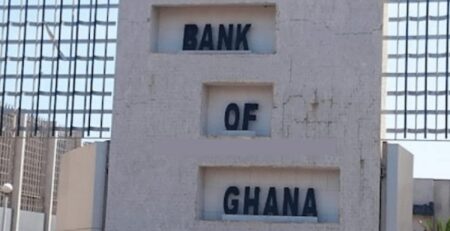BoG bares teeth at defaulting businesses
Governor of the Bank of Ghana (BoG), Dr Ernest Addison has lashed out at businesses that continually contract loans and fail to service them, calling for a cultural change in “businessmen in the way they treat borrowed money.”
According to Dr Addison, the development was largely responsible for high non-performing loans and banks’ lack of enthusiasm to lend to the private sector.
Commenting on observations that banks were generally not lending to businesses, the governor was unhappy with what he described as a borrowing-without-paying culture that was taking root in the country’s financial sector and making it a disincentive for banks to lend.
Dr Addison was speaking at the bank’s Monetary Policy Committee press briefing held in Accra yesterday, where a 100 basis point reduction of the policy rate (13.5%) was announced.
“I think that culture has to be changed. If you look at the list of the 100 large adversely classified borrowers, we realise we have a problem on our hands; they are firms that we know; the loans are non-performing; some of them have become serial borrowers and they do not service their debts.
“People who borrow and they think that they cannot pay; when you do that you create these kinds of difficulties and turn round and complain that the banks are not lending; but why would they lend if they are only going to be throwing customer deposits after such risks?” Dr Addison queried.
Slow wheels of justice not helping
Governor Addison lamented the slow manner in which cases are dispensed with at the country’s law courts, a situation he described as bad signal for investors.
“Unfortunately, our judicial system is also not helping. They tried to enforce the collaterals and these cases go on and on, one adjournment after another, so the environment does not help in addressing this problem of banks not lending to the private sector,” Dr Addison stated.
According to him, the collateral registry, the credit reference bureau, among other measures, were put in place to help the banks better assess their risks, but “unfortunately these don’t seem to be helping.”
There was a lot of work to be done to de-risk the private sector and make it attractive to the financial sector for lending, he intimated.
BoG working with banks to spur lending
The governor indicated that the BoG was working to lessen the incentive of banks putting their resources into government papers to rather provide the much-needed credit to businesses so they can grow and expand.
“We are going to be working with the banks to gradually move away from the overreliance on government paper and government itself will have to reduce its demand for funds from the market to allow that to happen,” he added.
Banking sector makes good showing
According to the BoG, banks’ profit before tax increased by 39.6% to GH¢2.3 billion, recovering from the marginal growth of 7.5% a year ago. Non-Performing Loans (NPL) ratio increased marginally from 15.0% in April 2020 to 15.5% in April 2021, arising partly from the general pandemic-induced repayment challenges, as well as some bank-specific loan recovery challenges.
The sector deployed effective cost control measures which resulted in a marginal 1.7% growth in operating costs over the review period, significantly lower than the 17.8% growth for the same period in 2020. Loan loss provisions however increased by 29.4%, compared with 7.1% a year ago, on account of continued elevated credit risks.
The banking sector, according to BoG, grew strongly in total assets, deposits and investments. Total assets increased by 16.4% to GH¢155.7 billion.
“This reflected strong growth in investments in government securities by 34.9% to GH¢73.3 billion funded by deposits and loan repayments,” the bank said.
It stated further that “total deposits recorded an annual growth of 24.2% to GH¢104.9 billion on the back of the strong liquidity flows from the fiscal stimulus and payments to contractors, and to depositors and clients of defunct SDIs and SEC-licensed fund managers respectively.”
Source: Finderonline














Leave a Reply